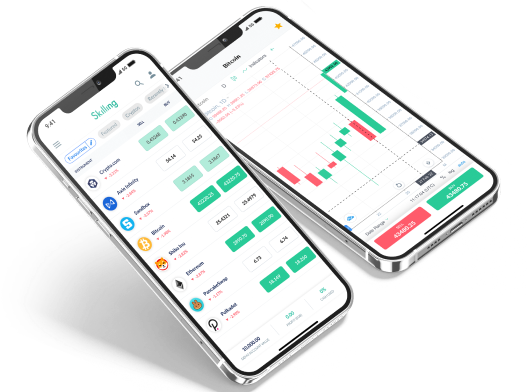The Federal Reserve's interest rate decision is a key economic event that influences various aspects of the economy and financial markets. This article will explain how these decisions are made, and their wide-ranging effects, answer some common questions and discuss how traders on platforms like Skilling can consider these factors in their trading strategies.
Experience Skilling's award-winning platform
Try out any of Skilling’s trading platforms on the device of your choice across web, android or iOS.

Fed interest rate decision
The Federal Reserve, or the Fed, sets the benchmark interest rate, which is a key tool for managing the United States' monetary policy. This rate influences lending rates throughout the country and is adjusted to control inflation and stabilize the economy. The decision-making process involves assessing various economic indicators, including inflation rates, employment figures, and GDP growth, to determine the appropriate interest rate level.
Effects of the Fed interest rate decisions
The Federal Reserve's interest rate decisions play a pivotal role in shaping the economic landscape of the United States and have far-reaching effects on global financial markets. Understanding these decisions, their implications, and how to respond to them is essential for traders and investors. The Fed's interest rate decisions have significant effects on the economy and financial markets:
- Consumer borrowing and spending: Interest rate changes directly influence the cost of borrowing for consumers. Lower rates make loans and mortgages more affordable, encouraging consumer spending and home buying. Conversely, higher rates can slow this down, as the cost of loans increases.
- Business investment and expansion: For businesses, interest rate adjustments affect borrowing costs for financing operations and expansions. Lower interest rates reduce the cost of borrowing, encouraging businesses to invest in growth and new projects. Higher rates can have the opposite effect, leading to reduced capital spending and potentially slowing down business growth.
- Stock market reactions: The stock market is particularly sensitive to interest rate changes. Lower interest rates generally make stocks more attractive, as they reduce the cost of capital for companies and often lead to higher corporate earnings. On the other hand, higher interest rates can dampen stock market enthusiasm, as borrowing costs rise and consumer spending may decrease.
- Bond market dynamics: Bond prices typically move inversely to interest rates. When rates go up, bond prices usually fall, and vice versa. This is because the fixed interest payments of existing bonds become more or less attractive compared to the new bonds issued at the current higher or lower rates.
- Currency value and international trade: Interest rate adjustments can also affect the value of the U.S. dollar. Higher rates tend to attract foreign investors looking for better returns on investments in U.S. assets, potentially strengthening the dollar. A stronger dollar can make imports cheaper but exports more expensive, impacting international trade balances.
- Inflation control: One of the Fed's key mandates is to control inflation. By adjusting interest rates, the Fed can influence economic activity to keep inflation at a target level. Lower rates can stimulate economic activity and spending, potentially leading to higher inflation, while higher rates can help cool down an overheating economy and reduce inflationary pressures.
- Overall economic health: Ultimately, the Fed's interest rate decisions are aimed at maintaining economic stability. By influencing borrowing costs, consumer spending, investment, and inflation, these decisions play a role in steering the economy toward sustainable growth.
FAQs
1. How often does the Fed adjust interest rates?
The Federal Open Market Committee (FOMC) meets several times a year to review economic conditions and decide on interest rate adjustments.
2. Why does the Fed change interest rates?
The Fed adjusts interest rates to manage economic growth, control inflation, and maintain employment levels.
3. How does the Fed's interest rate decision affect me as an individual?
Changes in interest rates can affect your borrowing costs, savings rates, and investment returns.
4. Can the Fed's decisions predict the direction of the stock market?
While the Fed's decisions influence the stock market, they are just one of many factors that affect market movements.
How Skilling supports traders during Fed rate changes
For Skilling, it is important the traders have an understanding of the implications of the Fed's interest rate decisions as it is a key factor to consider in the decision-making process. Skilling provides tools and resources that help traders stay informed about these economic events and their potential impact on various trading instruments. The platform offers real-time data, analysis tools, and educational resources, enabling traders to make well-informed decisions in response to changes in the Fed's interest rate.
In addition, Skilling offers informative webinars that are presented by, Tammy Da Costa CFTe, where economic events and price action are analysed. These webinars, combined with Skilling's advanced trading tools, provide traders with comprehensive insights and strategies to navigate the market effectively during these critical economic announcements. Join Skilling today
What's your Trading Style?
No matter the playing field, knowing your style is the first step to success.












